Finally an agreement on the sensitive file of migration and the reform of the European asylum system! The deadlock had lasted since 2016. It took a final stretch of 12 hours of fierce negotiations to get out of it. European interior ministers overcame their differences this Thursday, June 8, in the evening in Luxembourg in order to better manage migratory flows across the continent.
“I thought this day would never come,” admitted Maria Malmer Stenergard, Sweden’s Minister for Migration, who chaired the meeting, to applause. While Frontex, the European border guard agency, alerts on the continuous increase in crossings of the Mediterranean, it became urgent to stabilize a dysfunctional asylum system and at the origin of many tensions between the Member States such as, recently, between France and Italy.
Compulsory solidarity
For seven years, the 27 had been looking for a complex balance between the responsibilities of the countries of arrival of migrants such as Italy or Greece and the solidarity of those who are on the second line, such as France. In terms of responsibility, the compromise adopted provides for the screening of asylum seekers upon their arrival in the European Union. Those who come from countries where less than 20% of nationals obtain the status of “refugee” will be subject to a special procedure. Their requests will be processed on site as quickly as possible, they will not be formally admitted to European soil. The text even leaves the possibility of placing them in closed centres.
If their file is refused, they should be sent back as soon as possible. In return for this effort, which will be the responsibility of the front-line countries, the others have accepted the principle of “compulsory but flexible solidarity”: either they will welcome refugees on their soil, or they will have to pay 20,000 euros per migrant they refuse to relocate. A way of circumventing the objections of the countries of Eastern Europe which have refused since 2016 the principle of “quotas” for refugees.
Very complex processes
This “historic” agreement, according to German Interior Minister Nancy Faeser, still has to be accepted by the European Parliament. If this is the case, the texts could enter into force at the end of the mandate of the current European Commission. This was moreover the objective of the French presidency of the EU which, last year, had succeeded in relaunching becalmed discussions.
But many questions remain unanswered. “Are we going to be able to implement all of this in practice?” a diplomat is already wondering, a little bewildered by the complexity of the process. The system also relies heavily on the ability to deport rejected migrants. However, this depends on the good will of their country of origin. We know how difficult it can be with Algeria, Morocco or Tunisia. Italy would have liked to be able to make returns to any third country considered safe in the world. Some downright dream of a model where asylum applications would be outsourced, as the British want to do in Rwanda.
France and Germany have managed to kill this idea, but it could resurface if the new model does not work well. The success of this agreement will depend on the trust that will reign between European countries. “Today is not a point of arrival, it is the start of something,” concluded Italian Minister Matteo Piantedosi, who fought to the end to wrest as many concessions as possible from his partners.
